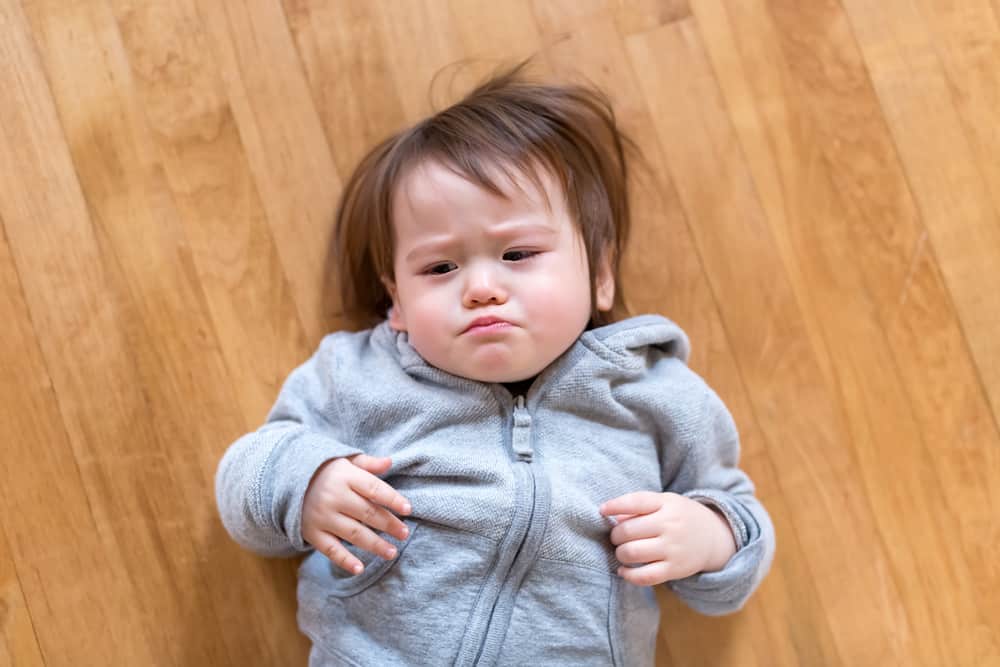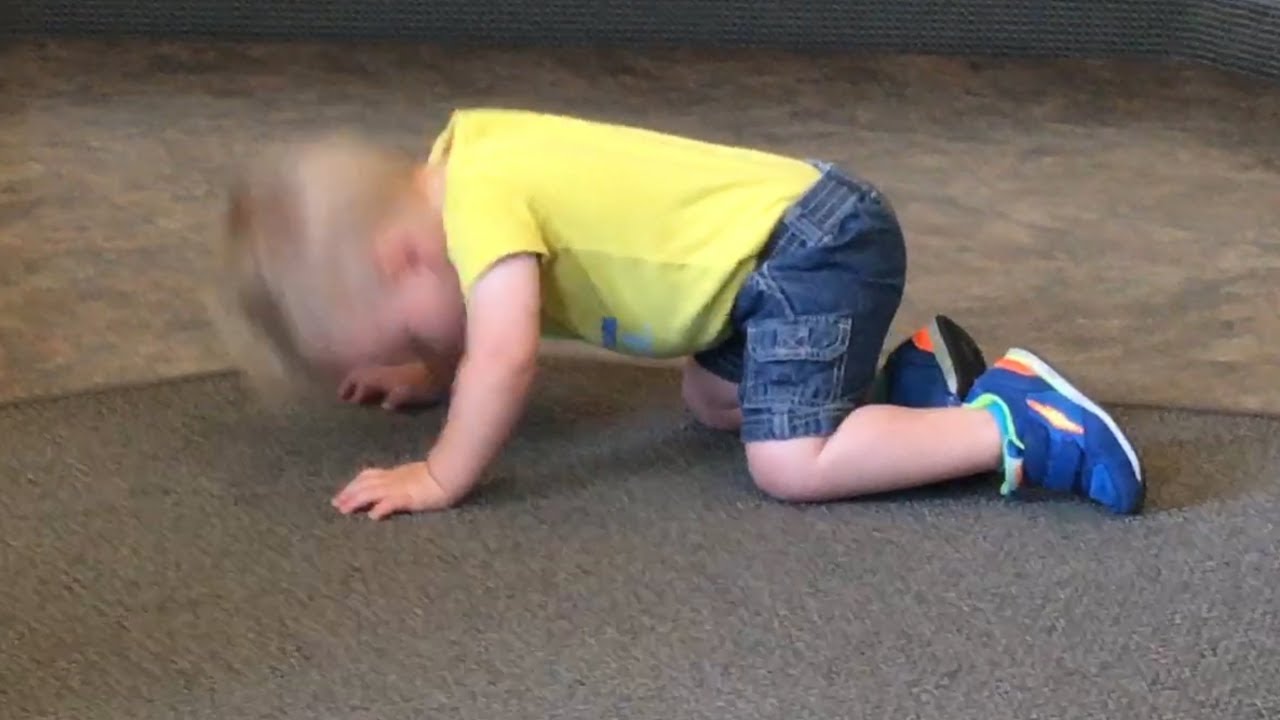How to Prevent Baby from Hitting Head on Floor?
To prevent a baby from hitting their head on the floor, parents can follow some simple steps. First, make sure your home is safe and well organized with no sharp edges or corners that could potentially hurt the baby. Second, keep an eye on the baby whenever they’re crawling around to ensure they don’t get too close to any dangerous areas.
Third, provide plenty of cushioning in case a fall does occur by placing soft rugs or mats in potential “danger zones” such as near stairs or furniture where falls are more likely to happen. Fourth, use safety gates at staircases and doorways so that babies won’t be able to access them without adult supervision. Finally, always place the baby in their crib when not being supervised and make sure it’s set up correctly with no loose parts or objects inside that could pose a risk for falling out of bed.
Following these steps should help reduce the chances of your baby hitting their head on the floor significantly!
- Set up a Soft Play Area – Create a soft play area in your home with plenty of pillows, blankets and other soft items to provide cushioning if your baby falls while learning to walk
- This will help prevent any potential head injuries from occurring when they inevitably stumble over their feet as they learn to move around on their own
- Place Mats Under Furniture – Put mats or rugs underneath furniture where your baby is likely to walk or crawl near so that if they do trip, the mat will give them some extra padding against the hard floor surface
- Use Safety Gates – Install safety gates at the top and bottom of staircases and doorways throughout your house so that you can keep track of where your baby is going without having to constantly follow them around every room in the house
- Monitor Your Baby Closely – Although it’s impossible for parents to be with their little one 24/7, try to stay close enough that you can get there quickly and minimize any potential bumps or bruises if necessary!

Credit: momlovesbest.com
Is It Normal for Babies to Hit Their Heads on the Floor?
It is normal for babies to hit their heads on the floor from time to time. This is because as they are learning how to control their bodies, it’s common for them to lose balance and fall down. When this happens, head contact with the ground or other objects can occur.
While it may be worrisome for parents when a baby hits his or her head, usually there’s no need for immediate concern if it doesn’t seem serious; however, if you have any worries about your baby hitting his or her head on the floor, please don’t hesitate to speak with your doctor. Be sure to watch out for signs of concussion such as confusion and excessive sleepiness in addition to keeping an eye on any bruising that could appear around the area of impact. It’s also important that you keep checking up on your child regularly after a significant bump like this just so you can make sure he or she is feeling ok and not showing any concerning symptoms.
What If My 7 Month Old Hit His Head on the Hardwood Floor?
If your 7-month old has hit his head on a hardwood floor, it is important to stay calm and assess the situation. First, observe your baby’s reaction. If he or she appears dazed or confused, contact your doctor right away for further evaluation and care.
Additionally, watch for signs of a concussion including vomiting, dizziness, headache, extreme sleepiness or fatigue and balance problems. While most babies will recover quickly from minor bumps on the head without any lasting effects there can be more serious underlying issues that require medical attention such as bleeding within the skull or fracture bones in their face/head area. It is best to err on the side of caution and seek professional advice even if you do not see any obvious signs of trauma upon initial inspection.
After all, our little ones cannot always communicate when something does not feel quite right!
How can I stop my baby from banging head on crib?
Baby Keeps Hitting Head on Floor
It is normal for babies to hit their heads on the floor as they are learning how to roll over and control their movements. This behavior usually peaks at around 4-6 months of age, but can start earlier or last longer depending on each baby’s development. It is important to provide a safe environment with no sharp edges, corners, or obstacles that may cause injury if your baby hits his head while developing these skills.
Additionally, it is beneficial to talk in a soothing voice and distract him from any uncomfortable situation he may find himself in during this process.
How to Stop Baby Banging Head on Cot
When it comes to stopping your baby from banging their head on the cot, it is important to take a proactive approach. Start by making sure that your baby’s environment is as safe and comfortable as possible – use soft materials in their sleeping space, provide lots of cushions and stuffed animals for comfort, and be sure to check the crib mattress regularly for any wear or tear. Additionally, make sure that there are no objects within arm’s reach that could harm them if they were to bang their head against them.
Finally, try talking with your baby when you notice them beginning to rock their heads against the cot – this can help distract them from engaging in this behavior.
Baby Hit Head on Floor While Crawling
Crawling is an important milestone for babies and toddlers, but it should always be supervised to ensure their safety. It’s not uncommon for a baby to accidentally hit their head on the floor while crawling, in some cases causing minor bumps or bruises. If your baby has hit his or her head on the floor while crawling, you may want to keep an eye out for signs of concussion such as nausea, vomiting, light sensitivity and loss of consciousness.
Seek medical attention immediately if any of these symptoms occur.
Baby Head Banging Autism
Baby head banging is a common symptom of autism that usually occurs in children between the ages of 1 and 4. It involves repetitively hitting or shaking one’s head against a hard surface, such as a wall or bed frame. This behavior can occur during sleep or while awake and can be very distressing for parents to watch.
While there are no known causes of baby head banging, some research suggests it may be due to sensory overload from an overstimulated environment or difficulty processing certain sensations. If you’re concerned about your child exhibiting this behavior, talk to their doctor about it and explore ways to help them cope with any underlying issues that may be causing it.
Toddler Hitting Head on Floor
When a toddler hits their head on the floor, it can be concerning and alarming for parents. Although this behavior is common among toddlers and not necessarily a cause for alarm, if your child is frequently hitting his or her head in an aggressive manner or with enough force to cause physical harm to themselves, you should contact your pediatrician right away.
Baby Hits Head on Crib While Sleeping
It is not uncommon for babies to hit their heads on the crib while sleeping. This can happen when a baby rolls over and bumps into the side of their crib, or if they are playing too roughly in bed. It is important to make sure that your baby’s sleep environment is safe by checking for any sharp edges or loose screws that could cause injury, and by making sure all toys are removed from the area before bedtime.
If your baby does bump their head, it may be necessary to take them to a doctor as soon as possible so they can assess whether there has been any internal damage.
Baby Banging Head When Angry
When babies get angry, they may bang their heads against hard surfaces in an attempt to express themselves and deal with the emotion. It is important for parents to remain calm when this happens and provide comfort to the baby while also gently redirecting them away from banging their head. This behavior should be closely monitored as it could indicate a more serious issue such as frustration or sensory overload.
If your baby continues to demonstrate this behavior frequently, it is best to seek professional advice from a pediatrician or child specialist.
1 Year Old Bangs Head When Mad
It is common for 1 year olds to bang their heads when they are feeling overwhelmed, angry, or frustrated. This behavior can be a sign of distress and usually happens when children don’t know how else to communicate what they’re feeling. It is important to remember that this behavior should not be ignored but rather addressed in a supportive manner with gentle guidance.
Parents should offer comfort and reassurance while also establishing appropriate boundaries so the child learns other ways of expressing themselves appropriately.
Conclusion
By following the tips outlined in this article, parents and caregivers can help prevent babies from hitting their heads on the floor. Making sure that all toys are age appropriate, keeping babies away from stairs, avoiding hard floors when possible, keeping beds low to the ground and providing plenty of padding for falls will go a long way in protecting baby’s head from injury. In addition to these measures, it is also important to always keep an eye on infants and toddlers at all times during playtime or nap time.
With proper precautions in place we can ensure our little ones are safe and sound!

